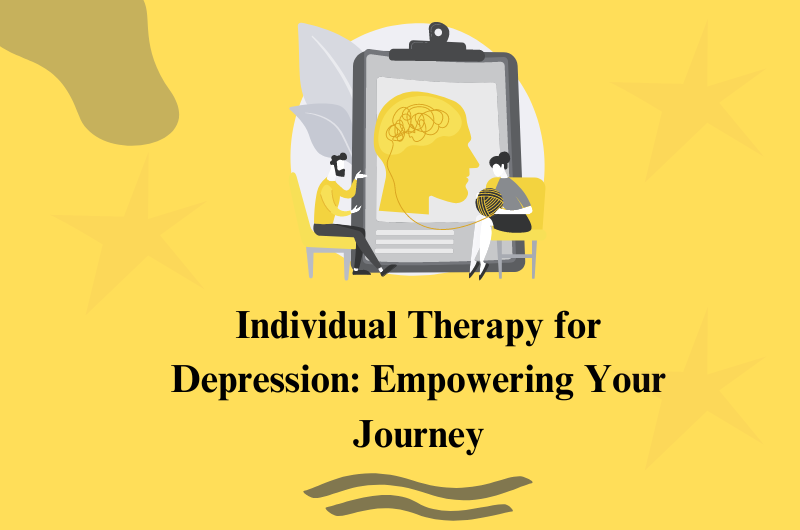What is the most effective therapy for depression?
Depression is a complex mental health condition that affects millions worldwide. For those seeking relief from the weight of depression, individual therapy stands as one of the most effective and widely recognized treatment approaches. In this article, we will delve into the reasons behind the effectiveness of individual therapy for depression and explore how it can bring hope and healing to those in need.
Understanding Individual Therapy for Depression:
Individual therapy, also known as talk therapy or psychotherapy, involves one-on-one sessions between a trained mental health professional and a person seeking support. The aim of individual therapy is to explore thoughts, feelings, behaviors, and underlying causes of depression while developing coping strategies and promoting emotional well-being.
Tailored Approach:
ne of the reasons why individual therapy is effective for depression is its personalized nature. Each individual's experience of depression is unique, shaped by factors like genetics, life experiences, and personal circumstances. Individual therapy allows therapists to tailor treatment approaches to the specific needs and challenges of the person seeking help.
Safe and Confidential Environment:
Individual therapy provides a confidential and non-judgmental space where individuals can openly express their thoughts and feelings without fear of criticism or repercussions. This environment fosters trust and encourages individuals to explore the root causes of their depression without reservation.
Building a Therapeutic Alliance:
The therapeutic alliance between the therapist and the individual seeking help is a cornerstone of effective individual therapy. This strong and collaborative relationship empowers individuals to share their experiences, develop insights, and work together with the therapist to create positive changes.
Evidence-Based Techniques:
Therapists use evidence-based techniques tailored to the individual's needs. Cognitive Behavioral Therapy (CBT), Dialectical Behavior Therapy (DBT), and Mindfulness-Based Cognitive Therapy (MBCT) are some of the approaches commonly used in individual therapy for depression. These techniques help individuals challenge negative thought patterns, develop healthier coping mechanisms, and improve emotional regulation.
Identifying and Addressing Underlying Causes:
Individual therapy dives into the root causes of depression, helping individuals understand and address factors that contribute to their emotional distress. This comprehensive approach not only offers symptom relief but also equips individuals with the tools to prevent future episodes of depression.
Holistic Approach:
Individual therapy often encourages a holistic approach to well-being. It may include discussions about lifestyle factors such as sleep, exercise, and nutrition that can impact an individual's mood and overall mental health.
Long-Term Benefits:
Individual therapy doesn't just provide short-term relief; it equips individuals with skills that can have lasting effects. These skills help individuals navigate challenges and maintain emotional well-being even after therapy has concluded.
Conclusion:
Individual therapy for depression offers a personalized, safe, and effective approach to healing. By delving into the individual's unique experiences and needs, therapists can help individuals understand the root causes of their depression, develop coping strategies, and work towards long-term emotional well-being. If you or someone you know is struggling with depression, seeking the guidance of a trained mental health professional through individual therapy can be a crucial step towards finding hope, healing, and a brighter future.
https://lyfsmile.com/blog/indi....vidual-therapy-for-d


What does relationship Counselling do?
Relationships are the heart and soul of our lives, providing us with companionship, love, and support. However, even the most loving relationships can face challenges and conflicts. When communication breaks down, trust is eroded, or emotional intimacy wanes, seeking help from a relationship counsellor can be a valuable and transformative step. In this blog, we will explore the essential role of relationship counselling and how it can help couples navigate difficulties, strengthen their bond, and foster healthier connections.
Creating a Safe and Neutral Environment:
One of the primary functions of relationship counseling near me is to provide a safe and neutral space for couples to express themselves openly. A trained and impartial relationship counsellor facilitates the sessions, ensuring that both partners are heard and understood without judgment. This environment encourages open communication, fostering empathy and understanding between the couple.
Improving Communication:
Effective communication is the foundation of a healthy relationship. Relationship counselling focuses on improving communication skills, teaching partners how to listen actively, express themselves clearly, and avoid destructive patterns such as criticism, defensiveness, and contempt. With improved communication, couples can resolve conflicts more constructively and connect on a deeper emotional level.
Identifying Patterns and Underlying Issues:
Relationship counsellors are skilled in recognizing patterns of behavior and communication that may be contributing to the challenges within the relationship. They help couples identify underlying issues and unresolved conflicts that might have been lingering beneath the surface. By addressing these core concerns, couples can work towards more lasting solutions.
Conflict Resolution:
Conflict is a natural part of any relationship, but how conflicts are managed can make or break a partnership. Relationship counselling equips couples with effective conflict resolution strategies, teaching them how to navigate disagreements without resorting to harmful tactics or avoidance. Learning to resolve conflicts constructively helps strengthen the relationship and fosters a sense of mutual respect.
Rebuilding Trust:
Trust is fragile and can be damaged by betrayal, dishonesty, or broken promises. Relationship counselling provides a structured approach to rebuilding trust within the relationship. It helps the hurt partner express their feelings while allowing the other partner to understand the impact of their actions. Trust-building exercises and open dialogue contribute to the gradual restoration of trust.
Enhancing Emotional Intimacy:
Emotional intimacy is a fundamental aspect of a strong and fulfilling relationship. Relationship counselling encourages partners to be vulnerable with each other, sharing their deepest thoughts and feelings. By nurturing emotional intimacy, couples can create a more profound and lasting connection.
Navigating Life Transitions:
Major life transitions, such as marriage, parenthood, or career changes, can put stress on a relationship. Relationship counselling provides support and guidance during these transitions, helping couples adjust to new roles and responsibilities together.
Conclusion:
Relationship counselling is a powerful resource that offers couples an opportunity to heal, grow, and revitalize their connection. By providing a safe and neutral space, enhancing communication skills, identifying patterns, and addressing underlying issues, relationship counsellors play a vital role in facilitating constructive change within relationships. Couples can learn to navigate conflicts more effectively, rebuild trust, and nurture emotional intimacy, ultimately fostering a stronger and more fulfilling partnership. Seeking professional help through relationship counselling is not a sign of weakness but a proactive step towards a healthier and happier relationship. Remember, investing in your relationship can lead to long-term happiness and fulfillment for both partners.


